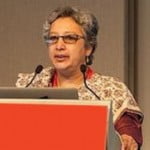
The government might form a panel to review the National Policy on Farmers, framed in 2007 (NPF-2007), said a senior official.
Radha Mohan Singh, minister of agriculture, had also indicated this during a debate, on drought, in Parliament on Thursday.
If there is a new policy, officials said the transferring of subsidies and incentives, as well as a differential payment system during a sharp slump in prices, are expected to be one of the objectives.
NPF-2007 was formed after the recommendations of a National Commission on Farmers, headed by eminent agricultural scientist M S Swaminathan. That panel gave five reports.
One recommendation it had made, on fixing of the Minimum Support Price (MSP) of crops at 50 per cent more than the weighted average cost of production, was rejected by the then government. This might, it was decided, distort the market.
However, the now-ruling Bharatiya Janata Party in its manifesto for the 2014 general election had promised to implement the Swaminathan panel’s recommendation on MSP.
There were 12 other recommendations the Swaminathan panel made but were not included in final NFP-2007.
With more reports on farmer distress, there have been calls to review the old policy. The Centre has also embarked on a process of direct payment of incentives into the bank accounts of farmers in sugar. It intends to do so for cotton growers, too.
In Uttar Pradesh, the state government has been experimenting with direct transfer of subsidy on seeds into the bank account of farmers, instead of routing it through dealers or wholesalers.
Officials said there was a suggestion that the soil health cards planned for issue to all farmers in the next few years could be one way to identify growers for transfer of subsidies, incentives and differential prices.
Among other things, final NPF-2007 recommends reforms in assets such as land, water, livestock and fisheries, issue of soil health passbooks to farmers, support services for women, a comprehensive social security scheme for growers and development of agricultural markets, among other things.




